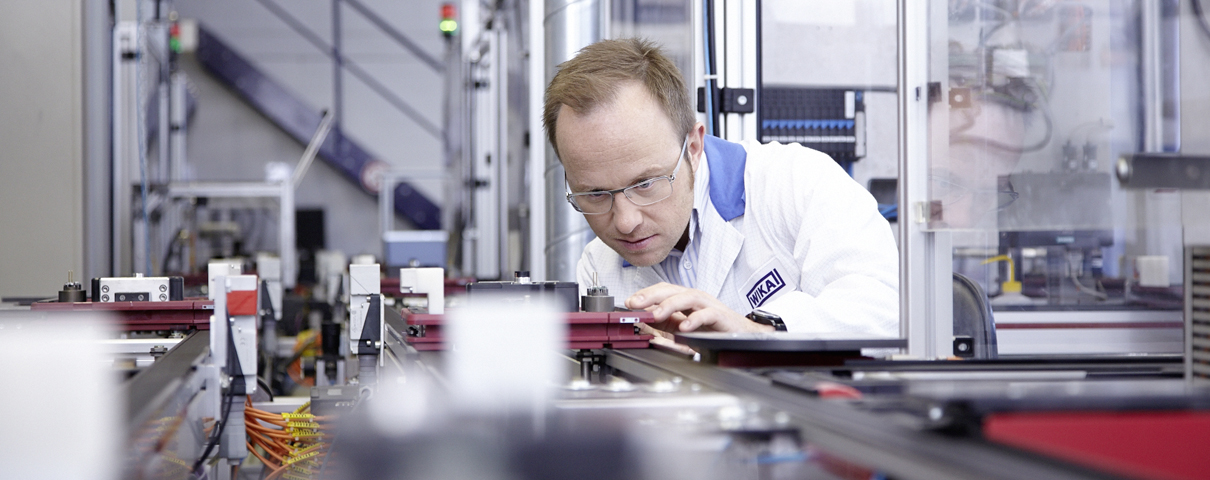Certain process media can damage pressure gauges, which, in turn, can contaminate clean process media. By using a diaphragm seal as a protective barrier, plant operators save time and money by avoiding instrument damage, batch losses, and expensive downtime.
If the only medium that a pressure gauge had to deal with were clean water at room temperature, then there would be no need for diaphragm seals. But the reality is that industrial processes often involve fluids that are corrosive, viscous, silty, contaminated, extremely hot, or otherwise incompatible for direct contact with sensitive pressure instrumentation.

A diaphragm seal separates the medium from the measuring instrument.
Why Use a Diaphragm Seal
A diaphragm seal creates a barrier between the process and the internal mechanisms of a pressure gauge. Process pressure pushes against the diaphragm, which in turn displaces the hydraulic fluid inside a gauge to relay information to the instrument. This protective membrane is strong enough to withstand harsh media, yet thin and flexible enough to allow pressure to be transmitted to the instrument. The gauge never comes into contact with the process itself, a good thing since certain fluids would clog or corrode the instrument’s sensitive mechanisms.
But a diaphragm seal also works the other way by protecting processes from the gauge itself. Certain media, such as those found in pharmaceuticals and the food and beverage industry, cannot risk contamination. A diaphragm seal makes sure hygienic processes never touch the insides of a pressure gauge. Also, by not having threaded connections, flush-mounted diaphragm seals can help reduce fugitive emissions.
How to Choose a Diaphragm Seal
The three most important factors to consider when choosing a diaphragm seal are the media’s temperature, pressure, and consistency. The table below lists some pressure-measurement challenges and the recommended solutions.
Diaphragm Seal Types and When to Use Them
Process condition | Diaphragm seal type | WIKA’s diaphragm seal solution (models) |
Corrosive | Diaphragm seal made of process-compatible materials, including stainless steel, alloys with precious metals (e.g., gold), exotic alloys (e.g., Hastelloy®, Monel®), and non-metallic options (e.g., PTFE) | 990.29 diaphragm seal with flange connections |
Extreme | Diaphragm seal with an 8-inch cooling tower that can withstand temperatures up to 750oF (400°C) | 990.FD clamped diaphragm seal, flange connection |
Highly viscous | Flush-mounted diaphragm seal with limited spaces/crevices where media could build up Offline diaphragm seal with optional flush port(s) for easy clean out | 990.27 diaphragm seal with flange connection, plus the 910.27 flushing ring 990.36 threaded process connection, small diaphragm seals |
Overpressure | Diaphragm seal with a continuous-duty contoured diaphragm bed | 990.27 diaphragm seal with flange connection |
Specialized media | Diaphragm seal designed for specific applications | 990.23 for pulp & paper 990.31 for wastewater treatment 990.SD for sanitary applications (food, beverage, pharmaceutical) |
Remote reading | Diaphragm seal with electronic pressure instrument Diaphragm seal with capillary line | 990.22 diaphragm seal with sterile connection, plus the SA-11 pressure transmitter |
Sanitary or clean | Diaphragm seal that complies with 3A sanitary protocols Diaphragm seal without dead spaces, to prevent bacterial settlement and growth A system with two diaphragm seals and an alert that warns of a DS breach | M93x.3A assembled diaphragm seal 981.22 INLINE™ diaphragm seal with sterile connection DMS-FP diaphragm monitoring system |
Toxic or hazardous | All-welded diaphragm seal assembly with helium leak-proof welds instead of process gaskets | M93X.D1 all-welded system (AWS) |
High-Performance Diaphragm Seals by WIKA

All-Welded System (AWS)
For decades, WIKA has been designing and manufacturing all types of diaphragm seals. These industrial pressure accessories are an affordable and practical solution when working with aggressive and difficult media. Our DS products come in multiple sizes with various process connections (threaded, flush, clamp, capillary), and can be made from a wide selection of materials to fit your particular application’s requirement.
For the most demanding applications, we offer the All-Welded System(AWS), where the gauge and DS are permanently fused to create one sealed pressure measuring instrument. This high-performance assembly is tamper-resistant and doesn’t allow access to the system fill fluid, thereby eliminating potential leak paths. The AWS is built to last even in extreme environments with high pulsation, thermal cycling, and overpressures.
Diaphragm seals are smart investments that help manufacturers protect both their pressure instruments and process media. For help in deciding which diaphragm seal is right for your particular application, contact the pressure measurement experts at WIKA USA.
Products mentioned in this article
• 990.29 diaphragm seal with flange connection, flange-type with extended diaphragm
• 990.27 diaphragm seal with flange connection, flush diaphragm
• 910.27 diaphragm seal accessories, flushing rings
• 990.36 diaphragm seal with threaded connection, flush diaphragm or protective plate
• 990.23 diaphragm seals for the pulp and paper industry
• 990.31 diaphragm seal with threaded connection, plastic version
• L990.SD tank spud, clamped sanitary diaphragm seal
• 990.22, 990.52, 990.53 diaphragm seal with sterile connection (TRI-CLAMP®)
• 981.22, 981.52, 981.53 in-line diaphragm seal with sterile connection (TRI-CLAMP®)
• DMS-FP diaphragm monitoring system with clamp connection for sanitary applications
• M932.3A, M933.3A assembled diaphragm seal for sanitary applications

